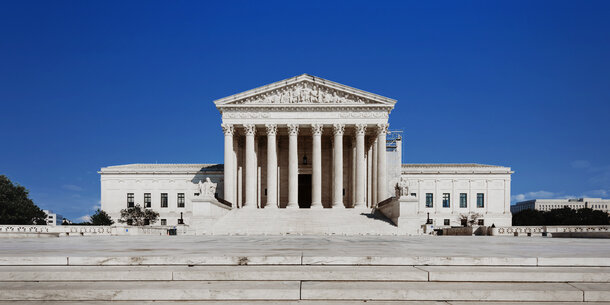Suscríbete aquí al boletín informativo del Brennan Center en español
- Un grupo de representantes republicanos volvieron a presentar el proyecto de ley SAVE Act, que le exigiría a toda persona estadounidense presentar un documento que pruebe su condición de ciudadanía para registrarse o volver a registrarse para votar.
- Este requisito podría privarles del derecho al voto a millones de estadounidenses elegibles.
- Más de 21 millones de ciudadanos estadounidenses en edad de votar no tienen fácil acceso a un documento que pruebe su ciudadanía.
Para comenzar el año, un grupo de representantes republicanos volvieron a presentar el proyecto de ley SAVE Act, que le exigiría a toda persona estadounidense presentar un documento que pruebe su condición de ciudadanía para registrarse o volver a registrarse para votar. Este proyecto de ley fue aprobado por la Cámara de Representantes el año pasado, pero no logró avanzar en el Senado.
Ahora que el partido republicano tiene una trifecta gobernante en Washington durante los próximos dos años, con poder sobre las dos cámaras del Congreso y la Casa Blanca, los representantes republicanos le darán un tratamiento acelerado al proyecto de ley en el recinto de la Cámara y han prometido convertirlo en un tema prioritario. Elaborada sobre la premisa de teorías conspirativas que se han refutado una y otra vez, la ley SAVE Act podría privarles del derecho al voto a millones de votantes estadounidenses elegibles, menoscabar la administración electoral y perjudicar a las autoridades electorales.
Privaría del derecho al voto a ciudadanos estadounidenses elegibles para votar
El SAVE Act ha sido propuesto a pesar de que las leyes federales y estatales ya establecen que solo las personas estadounidenses que son ciudadanas pueden votar en las elecciones federales y estatales; además, estas leyes imponen penas severas. Por otro lado, la Ley de Registro Nacional de Votantes (National Voter Registration Act) ya exige a las personas estadounidenses que desean registrarse para votar que confirmen su condición de ciudadanía, y las leyes de los pocos estados exentos a la Ley de Registro Nacional de Votantes exigen lo mismo.
En la práctica, el SAVE Act le exigiría al votante probar su ciudadanía cada vez que se inscriba para votar, lo cual significa que los millones de estadounidenses que se mudan cada año —ya sea a otro estado o, incluso, a la ciudad de al lado— no podrían volver a registrarse para votar sin presentar documentos de ciudadanía.
Para la mayoría de la ciudadanía estadounidense, la ley SAVE Act significaría que deben presentar un pasaporte o un certificado de nacimiento para inscribirse o reinscribirse para votar. Este requisito podría privarles del derecho al voto a millones de estadounidenses elegibles. Más de 21 millones de ciudadanos estadounidenses en edad de votar no tienen fácil acceso a un documento que pruebe su ciudadanía. Menos de la mitad de las personas adultas estadounidenses tiene un pasaporte válido, y millones no tienen acceso a una copia en papel de su certificado de nacimiento.
Algunas personas tienen muchas más probabilidades que otras de quedarse sin el derecho al voto. Por ejemplo, las personas mayores tienen más probabilidades de no contar con el tipo de documentos que la ley SAVE Act exigiría para votar. Dos terceras partes de la población negra estadounidense no tiene un pasaporte válido de los EE. UU., y la tenencia de pasaporte aumenta considerablemente con el nivel de ingresos.
Por lo general, las personas que se cambian el nombre, entre ellas, millones de mujeres casadas, no tienen un documento que pruebe su ciudadanía con su nombre actual. Y, tal como lo demuestran los dos ejemplos reales incluidos a continuación, en la práctica, los jóvenes votantes también podrían resultar afectados, con lo cual se observa un impacto desproporcionado sobre los dos extremos de la distribución por edad.
Los efectos perjudiciales del requisito de presentar documentos que prueben ciudadanía ya se han observado en los estados que impusieron este tipo de requisitos. Cuando Arizona y Kansas implementaron políticas parecidas a nivel estatal, decenas de miles de ciudadanos elegibles no pudieron inscribirse. En Arizona, las personas votantes que viven sobre territorio indígena, residen en campus universitarios o no tienen vivienda son las que menos tienen los documentos de ciudadanía requeridos para registrarse para votar en las elecciones estatales. En Kansas, el impacto de este requisito recayó con más fuerza sobre el electorado más joven y sobre aquellos que no tienen una afiliación política.
Las leyes de Kansas y Arizona que exigen una prueba de ciudadanía no solo impidieron que muchísimas personas estadounidenses pudieran votar, sino que también fueron imposibles de implementar con eficacia, tanto para los ciudadanos que deseaban registrarse como también para las personas votantes ya registradas desde hace décadas.
Los tribunales federales anularon el requisito de Kansas después de que impidiera que 31,000 personas ciudadanas eligibles se registraran para votar, y algunas de ellas no se pudieron inscribir ni siquiera después de presentar sus documentos de ciudadanía. Mientras muchos negacionistas electorales presionan para nacionalizar este requisito, el secretario de estado republicano de Kansas (que es la mayor autoridad electoral del estado) ha urgido a los otros estados y al gobierno federal a no seguir ese camino y señaló a fines de diciembre que “Kansas lo hizo hace diez años. No salió bien”.
La medida de Arizona también creó una pesadilla administrativa. En septiembre, el estado descubrió que a más de 200,000 votantes que se habían registrado antes de la adopción del requisito de presentar documentos de ciudadanía (y que, por lo tanto, no tenían datos de ciudadanía en los registros de votantes) se les había actualizado automáticamente su condición de ciudadanía en la base de datos de votantes, sin haber provisto ninguna documentación adicional.
Este error técnico puso en duda la elegibilidad de esos votantes legítimos registrados desde hacía mucho tiempo (en su mayoría, republicanos y residentes mayores) para votar en las contiendas estatales a unas pocas semanas de las elecciones de 2024. Al final, a estos votantes se les permitió votar en las elecciones estatales durante el ciclo de 2024 luego de un gran esfuerzo exitoso liderado por el partido republicano de Arizona, entre otras partes.
Además, la ley SAVE Act entorpecería las opciones de inscripción por internet y por correo, dos métodos de registro de votantes muy utilizados. Del mismo modo, también obstaculizaría las campañas de registro de votantes llevadas a cabo por los partidos políticos y grupos civiles no partidistas que suman cientos de miles de ciudadanos a los padrones electorales cada elección.
Obligaría a realizar purgas problemáticas de votantes
La ley SAVE Act obligaría a efectuar purgas de los padrones electorales que seguramente terminen eliminando a muchísimos votantes elegibles. Claro que, en los casos extremadamente raros en que se registren personas no ciudadanas (a menudo por un malentendido o porque les dieron a entender que podían votar), estas personas sí deberían eliminarse de las listas.
Pero la ley SAVE Act exigiría realizar purgas de votantes sin implementar las salvaguardas correspondientes. Por ejemplo, no obligaría a las autoridades electorales a notificar a la persona registrada antes de eliminarla del padrón, de modo que los votantes estadounidenses que sean purgados incorrectamente pueden no enterarse hasta que no vayan a votar. La condición de ciudadanía también puede cambiar con el paso del tiempo. En 2024, por ejemplo, unas 800,000 personas se convirtieron en ciudadanos naturalizados de los EE. UU. Eso significa que los datos utilizados para iniciar una purga pueden estar desactualizados, lo cual hace que la falta de una notificación al votante registrado sea particularmente problemática.
Sabemos que las purgas generalizadas de personas, supuestamente no ciudadanas, van a terminar afectando a otros votantes elegibles, porque ya lo han hecho. Los ejemplos abundan en tan solo 2024. Alabama intentó purgar a 3,251personas que se sospechaba que no eran ciudadanas, pero un litigio posterior reveló que la lista incluía al menos a 2,000 votantes estadounidenses eligibles. Un tribunal federal de distrito impidió realizar esta purga ilegítima y defectuosa.
La purga de 1,600 personas supuestamente no ciudadanas en Virginia también incluía a ciudadanos eligibles. Pero, tan solo a seis días de las elecciones de noviembre, la Corte Suprema federal le permitió a Virginia proceder con la purga. El Washington Post examinó los registros judiciales estatales de Virginia y una serie de entrevistas con autoridades electorales y no halló ninguna prueba que demostrara que alguna persona no ciudadana intentó votar en el estado en los dos años y medio anteriores. Las purgas defectuosas realizadas en Ohio y Texas el año pasado también arrastraron a ciudadanos elegibles.
Perjudicaría a las autoridades electorales
El SAVE Act pondría a las autoridades electorales en una situación legalmente precaria. Si este proyecto se convierte en ley, las autoridades electorales podrían enfrentar sanciones civiles y penales por registrar a alguien que no presentó un documento que pruebe su ciudadanía, aun cuando la autoridad electoral haya cometido un error sincero y aun cuando la persona registrada fuera, de verdad, ciudadana. Estas penalidades son muy problemáticas, porque la ley SAVE Act les da a las autoridades electorales locales la libertad de determinar si una persona solicitante que no tiene los documentos requeridos ha presentado, de alguna otra forma, suficientes pruebas que demuestren su ciudadanía para registrarse.
En términos simples, la ley SAVE Act les ataría las manos a las autoridades electorales locales. Por un lado, el proyecto de ley los carga con la responsabilidad de resolver los detalles prácticos de su implementación. Por el otro, los amenaza con la posibilidad de enfrentar consecuencias penales si se equivocan. El riesgo de sanciones civiles y penales podría hacer que las autoridades electorales rechacen solicitudes de registro enviadas por ciudadanos estadounidenses elegibles. Y la amenaza de ser procesadas o enjuiciadas intensificará aún más la rotación de las autoridades electorales, que han abandonado sus puestos en grandes cantidades durante los últimos cinco años en vista del acoso y las amenazas recibidas.
El requisito de ley SAVE Act de presentar un documento que pruebe la condición de ciudadanía es una solución en busca de un problema. Las alegaciones de un voto no ciudadano generalizado han sido desmentidas rotundamente. Los estudios demuestran que votan únicamente las personas ciudadanas estadounidenses y que las excepciones son extremadamente raras. Las investigaciones estatales sobre padrones electorales han confirmado una y otra vez este dato.
El Congreso puede y debe resolver los retos reales que socavan nuestra democracia. En cambio, con el SAVE Act, quienes niegan las elecciones y propagan teorías conspiratorias están buscando inclinar el sistema electoral a su favor y, para ello, quieren impedirles a millones de personas ciudadanas elegibles que salgan a votar.
Traducción de Ana Lis Salotti.




